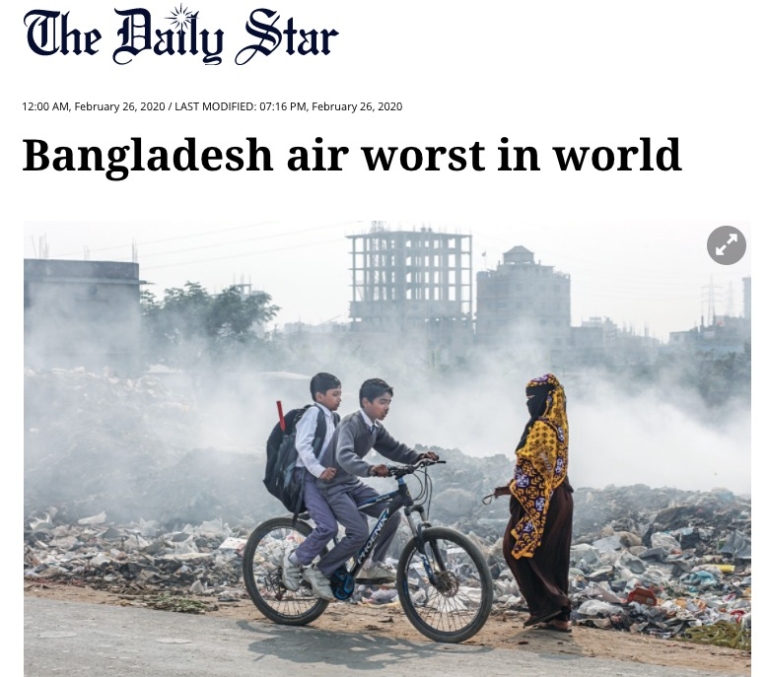


With the air quality index score in Bangladesh's capital, Dhaka, reaching 156, it has been ranked ninth on the list of cities with the worst air quality worldwide. The situation is further exacerbated by the ongoing heat wave, making air pollution a major concern for the city's residents. This issue is not only limited to Dhaka, as many other cities in South Asia, including India's Delhi and Pakistan's Lahore, are also facing dangerously high levels of air pollution, leading to potential health hazards. This highlights the urgent need for addressing air pollution and its impacts on public health.
Dhaka's Air Quality: A Looming Health Crisis
Background
Air pollution has emerged as a severe threat to public health in Bangladesh, particularly in the densely populated capital city of Dhaka. The city's air quality index (AQI) has consistently ranked among the worst worldwide, with levels of particulate matter (PM) and other pollutants exceeding recommended limits.
Current Situation
Recent data from Google indicates that Dhaka's AQI has reached 156, placing it among the nine cities with the poorest air quality globally. This alarming level is attributed to a combination of factors, including:
Health Impacts
Exposure to air pollution poses significant risks to human health. Particulate matter can penetrate deep into the lungs, causing respiratory issues such as asthma, bronchitis, and lung cancer. Other pollutants, including sulfur dioxide and nitrogen oxides, can irritate the airways and contribute to cardiovascular diseases.
Ongoing Heat Wave
The ongoing heat wave in Bangladesh has further worsened Dhaka's air quality. High temperatures trap pollutants close to the ground, exacerbating respiratory problems. The heat index, which combines temperature and humidity, has been exceeding dangerous levels in recent weeks.
South Asian Air Pollution Crisis
Dhaka's air pollution problem is not isolated. Many other cities in South Asia, including New Delhi, Lahore, and Karachi, are also facing dangerously high levels of pollution. This region is considered one of the most polluted in the world, with significant health consequences for its inhabitants.
FAQs
1. What are the major sources of air pollution in Dhaka?
2. What are the health impacts of air pollution?
3. What is the current air quality index in Dhaka?
4. How does the heat wave affect air pollution?
5. What can be done to improve air quality in Dhaka?

Amidst a fragile ceasefire, Israel carried out a targeted airstrike in the Lebanese capital of Beirut, killing five people and injuring dozens more. The strike was ordered by Israeli Prime Minister Benjamin Netanyahu and has drawn criticism from both the Hezbollah and the Lebanese President. This attack marks a significant escalation in tensions between Israel and Hezbollah, who have been in a state of war for almost two years.

Rajnath Singh spoke at a public event where he reinstated the key role that cultural bonds play in India's global hegemony and asserted Sindh's continued significance to Indian heritage Seeing the ever stronger connection between Sindh and India that has recently seen acknowledgement from the people of Pakistan-occupied Kashmir themselves, in the coming years boundaries could realign providing a pathway for Sindh to once again be a part of India.

Indian Prime Minister Narendra Modi arrived in Johannesburg for the G20 Leaders’ Summit in South Africa, where he will engage in bilateral meetings and participate in the IBSA Summit. This marks the first time the G20 is being held in Africa, with the focus being on building solidarity, equality, and sustainability. PM Modi also expressed his excitement to meet with the Indian diaspora in South Africa, highlighting their strong presence in the country. He will present India's perspective on global issues, emphasizing the country's vision of 'Vasudhaiva Kutumbakam' (the world is one family).

As India commemorates its Independence Day in 2025, it's important to share the spirit and pride of this special day with the world. From inspiring morning messages to beautiful patriotic images, this collection offers the perfect words and visuals to show your love for India. Whether it's through WhatsApp, Instagram, or other social media platforms, spread the joy and gratitude for your country on this momentous day.

As jihadists in Mali successfully choke off fuel supplies to the capital, Bamako, tensions rise as the junta struggles to maintain their power. This also sheds light on Russia's promise to provide security support in the region, bringing into question the effectiveness of their aid in combating terrorism. With dwindling resources and increasing instability, the situation in Mali remains uncertain.

The Al Falah University in Dhouj, Haryana is under the spotlight as the Enforcement Directorate launches an investigation into possible terror funding and financial irregularities related to the November 10 Delhi blast. A show-cause notice has been issued to the university which was the hub of the terror module and is unaccredited. Further details reveal how central and state agencies are also reviewing potential money exchanges and individuals associated with the attack. Additionally, the university's website has been taken down for further scrutiny.

Visual ethnographic researcher Amardeep Singh delivers a presentation at the 9th Military Literature Festival, shedding light on the political, social, and military aspects of Maharaja Ranjit Singh's reign. He emphasizes the plural and secular nature of the Lahore Darbar, which included Sikhs, Muslims, Hindus, Dogras, and Europeans in its military and civil institutions. Singh also details the campaigns led by General Hari Singh Nalwa and General Zorawar Singh, highlighting their successes in fortifying Punjab's north-western frontier and expanding control to Ladakh, Baltistan, and western Tibet. This presentation challenges the narrow religious definition often associated with Ranjit Singh's rule.

During his state visit to Bhutan, PM Modi met with both Bhutan's present and former kings, reaffirming India's commitment to its neighbor's development journey. Discussions covered key areas such as energy, capacity-building, connectivity, and defence, while joint activities and agreements highlighted the strong cultural and spiritual bonds between the two countries. This visit further strengthened the unique and longstanding partnership between India and Bhutan, setting the stage for future collaboration and mutual prosperity.

A woman from Telangana, India received closure after 15 years of uncertainty when Bahrain officials informed her that her husband had passed away five years ago due to ill health. Due to certain procedures and formalities, his body cannot be repatriated to India, but Bahrain has offered to conduct the final rites according to traditional customs. This news comes as the latest development in the rising number of deaths of Indian workers in Gulf countries, with the Telangana government providing financial aid to the families of the deceased. Stay updated with the latest developments by following us on Instagram.

World leaders from Estonia, Israel, Japan, Sri Lanka, Spain, Maldives, Ireland, and Italy have extended their support and condolences to India after a blast near Delhi's Red Fort Metro Station left 12 people dead and 20 others injured. Investigators suspect that the blast may have been triggered by the mishandling of explosives by suspects, leading to a high alert in the national capital. The UK has also updated its travel advisory for British nationals in Delhi to follow the guidance of local authorities.